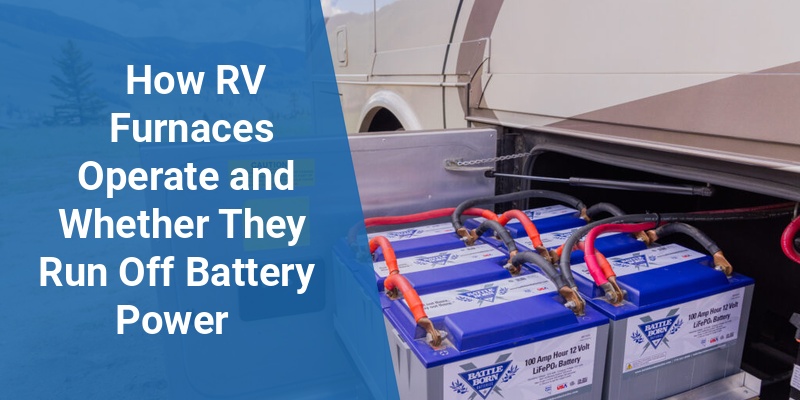RV owners often ask, “Does an RV furnace run off battery power?” Understanding how RV furnaces are powered is essential for planning trips, managing energy consumption, and ensuring comfort in varying conditions. This article explores how RV furnaces operate, the role of battery power, and optimal ways to manage furnace use while off-grid.
| Power Source | Function | Typical Energy Use |
|---|---|---|
| Propane | Main heat generation | High energy, fuels heat element |
| 12V Battery | Controls ignition, blower fan, and control board | Low to moderate energy, powers electrical components |
| Shore Power or Generator | Powers furnace and recharges battery | Variable energy, depends on furnace use and recharging needs |
How RV Furnaces Generate Heat
Most RV furnaces use liquid propane (LP gas) as the primary fuel for heating. The propane fuels a burner that creates heat. This heat then circulates through the RV by a blower fan. The propane system is advantageous for RVs because it provides efficient heat output using a relatively small fuel source.
Role of the Battery in RV Furnace Operation
While propane is the main fuel for heat, the RV furnace requires 12-volt DC battery power to operate its electrical components. These components include the ignition system, which lights the propane burner, the blower fan that distributes warm air, and the control circuits or thermostat.
- Ignition System: Uses battery power to create a spark or heat to light the propane burner.
- Blower Fan: Circulates warm air through the RV’s living spaces, powered by the 12V battery.
- Control Board and Thermostat: Require battery power to monitor and manage furnace operation.
Without sufficient battery power, the furnace cannot start or operate the blower fan effectively, even if propane is available.
Battery Drain and Furnace Runtime
Using an RV furnace continuously off battery power can quickly drain the battery. The blower fan draws a significant amount of current depending on the furnace model. On average, an RV furnace blower uses around 5 to 10 amps at 12 volts.
Because of this, running the furnace for extended periods solely on battery power can deplete the battery within a few hours, especially if the battery capacity is limited.
Example Battery Usage Calculation
| Component | Current Draw (Amps) | Operation Time (Hours) | Total Amp Hours Used |
|---|---|---|---|
| Blower Fan | 7 | 4 | 28 |
| Ignition & Controls | 1 | 0.5 | 0.5 |
For a 100Ah battery, running the furnace blower for 4 hours could consume more than a quarter of the battery capacity, underscoring the importance of battery management and recharging options.
Call 888-906-9139 for Free Local HVAC Quotes – No Obligation, Just Savings!
Running RV Furnaces Off Shore Power or Generators
When connected to shore power or a generator, the furnace electrical components draw power directly without draining the battery. This setup allows longer use of heat without concerns about battery depletion.
Additionally, shore power or generators can recharge the batteries, ensuring that 12V systems have sufficient power for ignition and blower functions.
Tips for Efficient RV Furnace Use Off Battery Power
- Use a high-capacity deep cycle battery designed for sustained power draw.
- Limit blower fan runtime by adjusting the thermostat or using furnace fan-only mode sparingly.
- Supplement with propane heaters or electric blankets to reduce furnace dependency.
- Regularly recharge batteries using solar panels, generators, or shore power.
- Ensure proper furnace maintenance to improve efficiency and reduce energy requirements.
Common RV Furnace Types and Their Power Needs
| Furnace Model | Fuel Type | Battery Use | Additional Power Features |
|---|---|---|---|
| Suburban Furnace | Propane | 12V battery for blower and ignition | Compatible with furnace fans and control boards |
| Atwood Furnace | Propane | 12V battery for ignition and fan | Some models include electric ignition options |
| Truma Furnace | Propane (some electric hybrid models) | 12V battery for controls and fan | Hybrid models can operate with electric heat if connected to shore power |
Conclusion
RV furnaces primarily rely on propane for heat generation but require 12V battery power to operate the ignition system, blower fan, and control electronics. The battery does not directly fuel the heat but is essential for furnace operation. Running an RV furnace solely on battery power can quickly drain the battery, so users should plan to recharge batteries often or utilize shore power or generators for extended heating needs.
